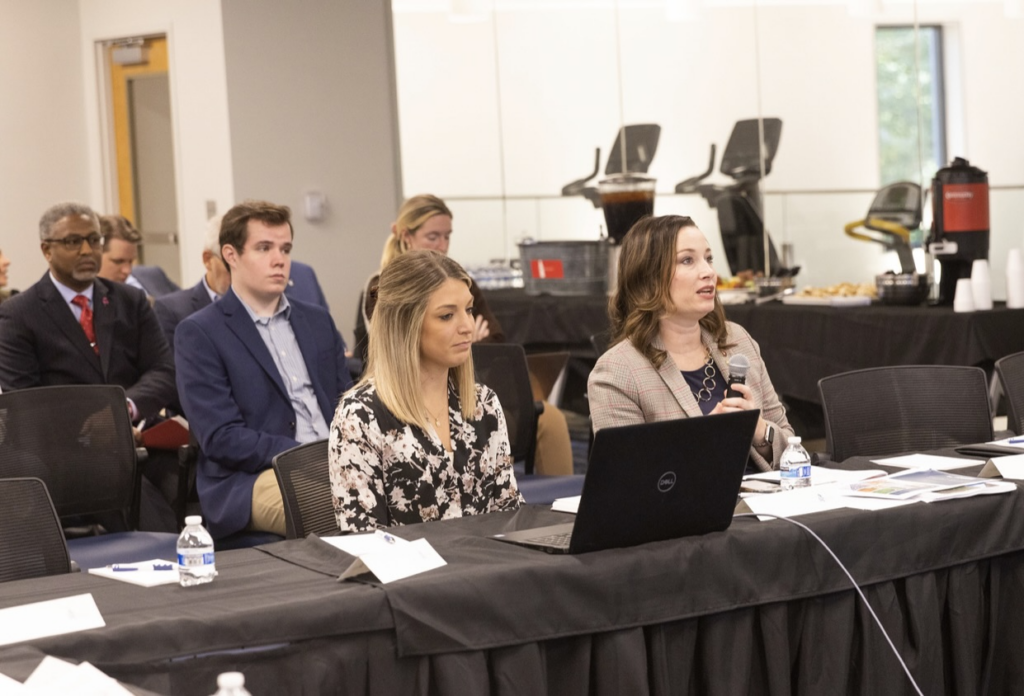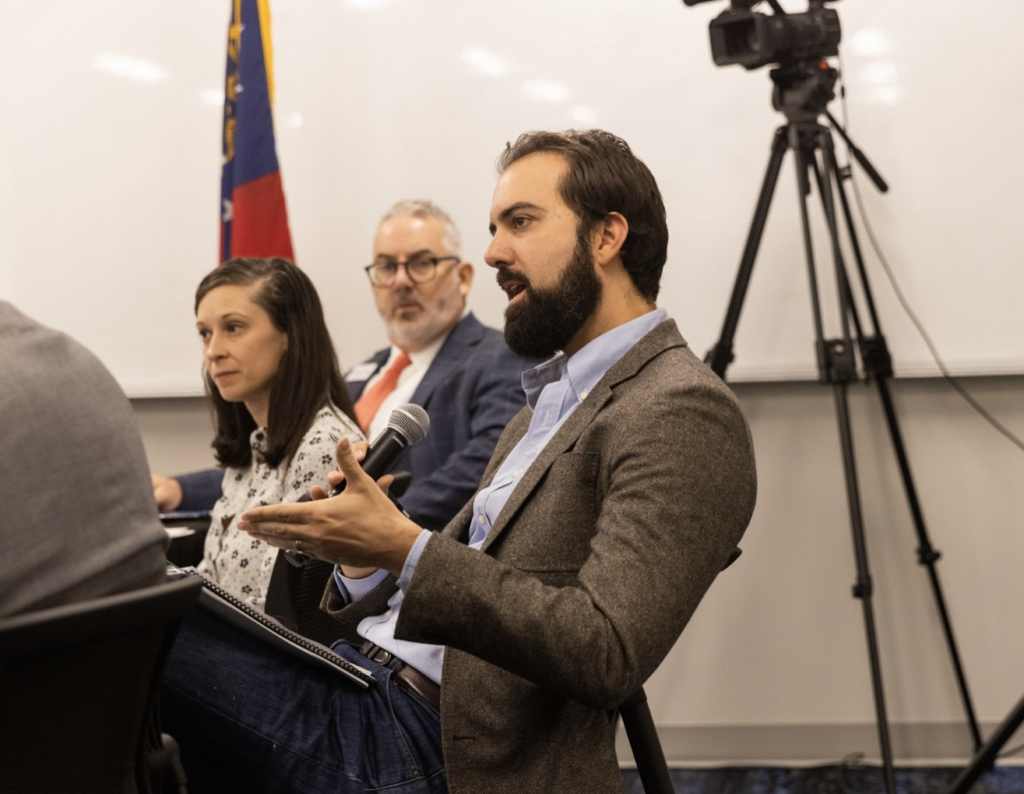Stay ahead of the curve as a political insider with deep policy analysis, daily briefings and policy-shaping tools.
Request a DemoInterview no-shows, unqualified applicants impede employer hiring

Qcells’ Dalton factory makes solar panels and now employs 2,000 people. (Credit: Qcells North America)
DALTON — What does it take to fill a job in Georgia, where the unemployment rate is 3.4%, slightly lower than the national average?
Some employers offer candidates free technical training and college tuition, while others tout flexible work hours. For an automotive dealer, it’s thousands of dollars in free tools and the promise of a six-figure salary. One restaurant owner is even offering pet bereavement pay to attract and retain employees.
Employers, educators, legislators and others gathered for the Senate Study Committee on Expanding Georgia’s Workforce on Thursday to discuss Georgia’s recruitment and retention challenges at a time when the number of available jobs are at an all time high. Some offered solutions they hope the state will consider adopting.
Hunter Loggins, the state director of the National Federation of Independent Businesses in Georgia, said a recent survey of the group’s Georgia members showed that 71% have open positions to fill, and 92% are having trouble finding qualified applicants.
Some of the toughest jobs to fill are mechanics, electricians, salespeople, truck drivers and a variety of technician jobs, he said. Businesses report that many applicants are not qualified due to a lack of education, work experience and work ethic. Many job postings have no applicants at all.
Loggins asked the state to expand the certificate and licensing programs offered at technical colleges, including commercial driver’s license training. He noted that other states, including South Carolina, are offering free tuition and fees for students in high-demand fields. Virginia is recognizing out-of-state credentials for 85 licensed professions and waiving the knowledge test required for a commercial driver’s license for military veterans with motor vehicle experience. (Georgia is also considering such licensing reforms).
Home Depot is trying to help out professional contractors hard pressed to find skilled workers in a construction industry where 400,000 jobs are available, said Erin Izen, senior director of workforce programs.
“Less than 3% of young people coming out of high school are interested in skilled trades, due to an incorrect assumption that it’s dirty, not reliable … not lucrative,” she said. “We’ve got to flip the script.”

The Atlanta-based retailer, which has 2,300 stores nationwide, plans to open 80 more stores in the next five years and also needs more workers, she said.
Home Depot recently launched a program called Path to Pro, which connects “pro” contractors with potential employees, some of whom have construction skills and experience, and others who need training in soft skills like “showing up on time, having a positive attitude and being willing to learn,” Izen said.
“Our pros say: ‘I’ll teach them how to use a tape measure and everything else they need to know at the job site. If you can just have them show up, that’s all I need,’ ” she said.
The program features a jobs board that Izen called “LinkedIn for the trades.” So far, 21,000 job candidates have signed up and 2,200 jobs have been posted. But with 15.5 million contractors seeking workers, she said, “we’ve got to get some more prospects into the portal.”
Home Depot would like state legislators to “build programs and policy to encourage nontraditional, blue-collar career paths” and to join forces with the private sector to “bring back shop class in K-12 education,” she said.
Several employers said that using traditional job ads and trying to recruit at job fairs is getting them nowhere.
Ryan Pernice, a committee member who owns three restaurants in Roswell, said 58% of his job applicants don’t show up for their in-person interviews. “Do I need a robot to talk to other robots?” he asked.

Lisa Nash, human resources leader at Qcells, a solar panel manufacturer that employs 2,000 workers, said that when it opened its first facility in Dalton in 2019, it hired 700 people in two months. “We had 400 people show up for a job fair,” she said. “Now at job fairs, you’re attracting 50 people if you’re lucky.”
As Qcells is building a new facility in Cartersville, it needs to hire an additional 2,000 staff by the end of 2024. Nash said with the unemployment rate so low, she’s competing with other local companies. “And I’m not recruiting unemployed people,” she said. “I’m recruiting someone who is working somewhere else, and that may be Mohawk or Shaw,” two local employers in the flooring industry.
To help develop the talent pool, Qcells is investing in middle school and high school career development programs, robotics teams and making other efforts “to get kids interested in manufacturing,” Thrower said.
Shaw Industries, a $6.5 billion flooring manufacturer, is focusing on apprenticeships with the state’s technical college system, said Brian Cooksey, director of workforce development. Shaw has relationships with Dalton State University to train and employ high school students working towards two-year technical certificates and four-year engineering degrees.
Cooksey asked legislators to expand the high demand career and apprenticeship programs in the state’s technical colleges.
Auto industry employees are also in short supply, said Ben Jordan with the Georgia Automobile Dealers Association, whose members include 500 dealerships employing 35,000 Georgians.
Finding technicians is their biggest challenge, he said, as newer vehicles have sophisticated technology systems that require people who are not just mechanics but highly trained professionals. And, he said, many “experienced industry veterans who are proficient techs are reaching retirement and will be difficult to replace … We’re not getting enough folks graduating from tech schools nationwide.”
While two-year technical schools have seen a surge of enrollment nationally since 2020, enrollment in mechanic and repair technologies trade programs has decreased about 5%, according to the National Student Clearinghouse. Georgia’s two-year technical school enrollment dropped 3.6% this year.
Jason Denson, owner of a Ford dealership in Dalton, said his strategy to recruit and retain workers is to offer salaries ranging from $50,000 to more than $100,000, and to “give them a career path and timeline to achieve it [the higher salary] during the interview process.”
The dealership sweetens the deal with benefits like purchasing its technicians’ tools and toolboxes, which can become theirs after a period of time on the job, he said, noting that some of his technicians have more than $400,000 worth of tools.
Workforce committee chair, Sen. John Albers, R-Roswell, said the sixth and final meeting of the committee will be on Nov. 14 at the Capitol, and asked members to bring their legislation, policy and budget proposals.
Have questions, comments or tips on education in Georgia? Contact Jill Jordan Sieder on X @journalistajill or at [email protected].
Facebook @STATEAFFAIRSGA
Instagram @STATEAFFAIRSGA
LinkedIn @STATEAFFAIRS
Header photo: Qcells’ Dalton factory makes solar panels and now employs 2,000 people. (Credit: Qcells North America)
Newly minted Senate Minority Leader Harold Jones II: ‘I’m not the typical back-slapping politician’
Nearly 10 years into legislative life, Sen. Harold Jones II wouldn’t change anything about the experience. “I love every minute of it. Even when I hate it, I love it,” the 55-year-old Augusta Democrat told State Affairs. Come January, Jones will add another role to his legislative duties: Senate minority leader, a job held for …
Gov. Kemp calls on state agencies to be fiscally restrained amid record $16.5B surplus
The Gist Gov. Brian Kemp asked the state’s 51 government agencies for continued fiscal restraint when drafting their amended fiscal year 2025 and 2026 budgets. Most agencies adhered to his request even as the state’s general fund surplus hit a record $16.5 billion last month. Forty-five agencies, excluding state courts, followed the governor’s instructions to …
Georgia defies bomb threats as election chief declares a “free, fair and fast” vote amid record turnout
ATLANTA – Despite dealing with over 60 bomb threats, Georgia’s election chief said Tuesday the state’s general election went smoothly. Georgia had a record turnout with nearly 5.3 million people voting, Secretary of State Brad Raffensperger told reporters. Election officials in the state’s 159 counties have until 5 p.m. to certify votes. “We had a …
In the (state)house: Meet the newest members of the Georgia legislature
When lawmakers reconvene at the state Capitol on Jan. 13, there’ll be a cadre of new faces in the 236-member Georgia General Assembly, one of the nation’s largest state legislatures. All 236 statehouse seats were up for election this year. Most candidates ran unopposed. Incumbents in contested races easily kept their seats, with the exception …




